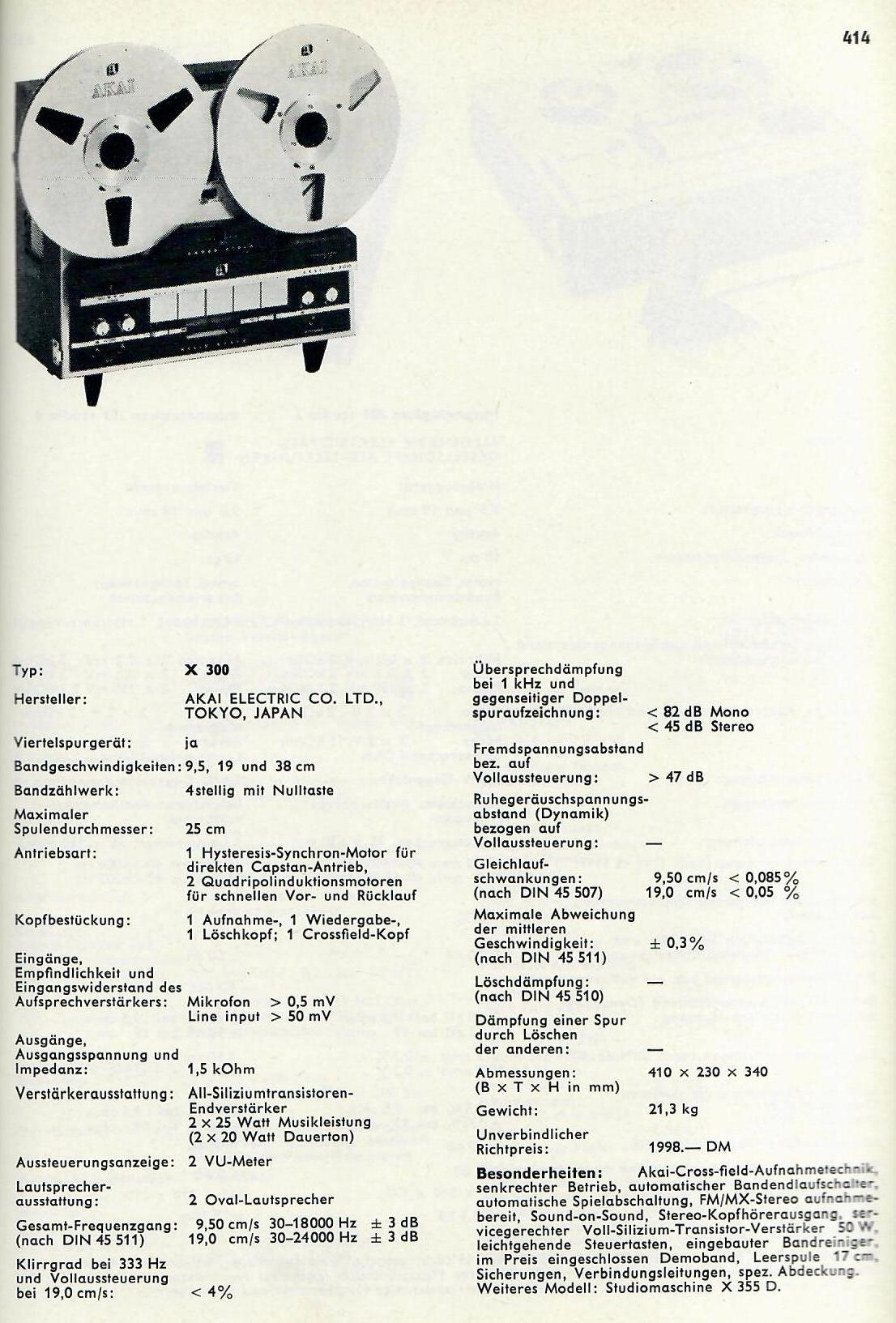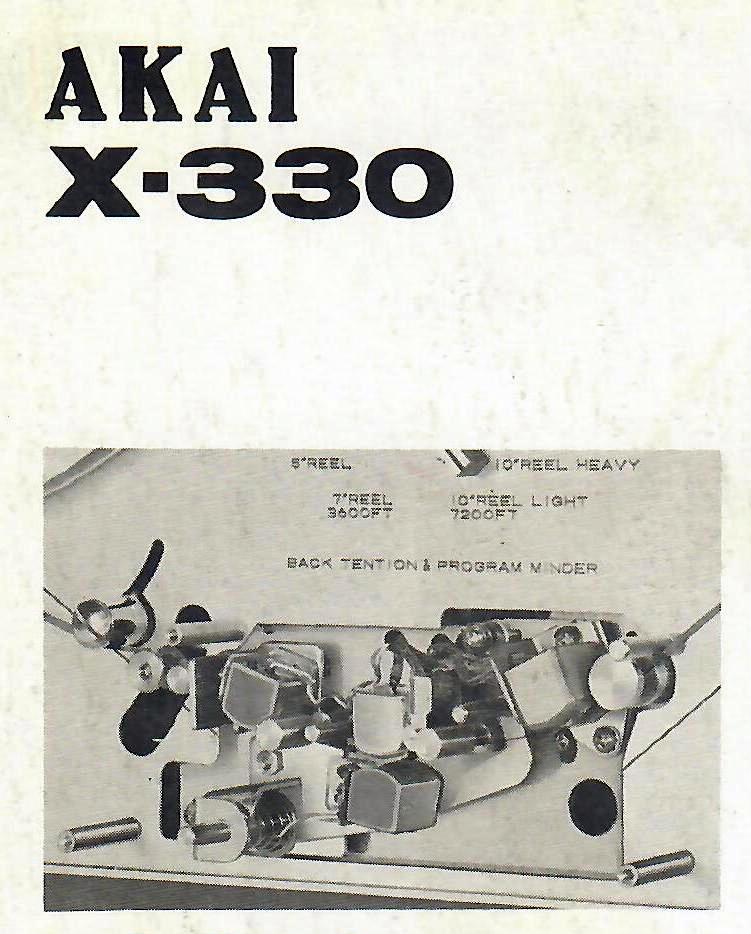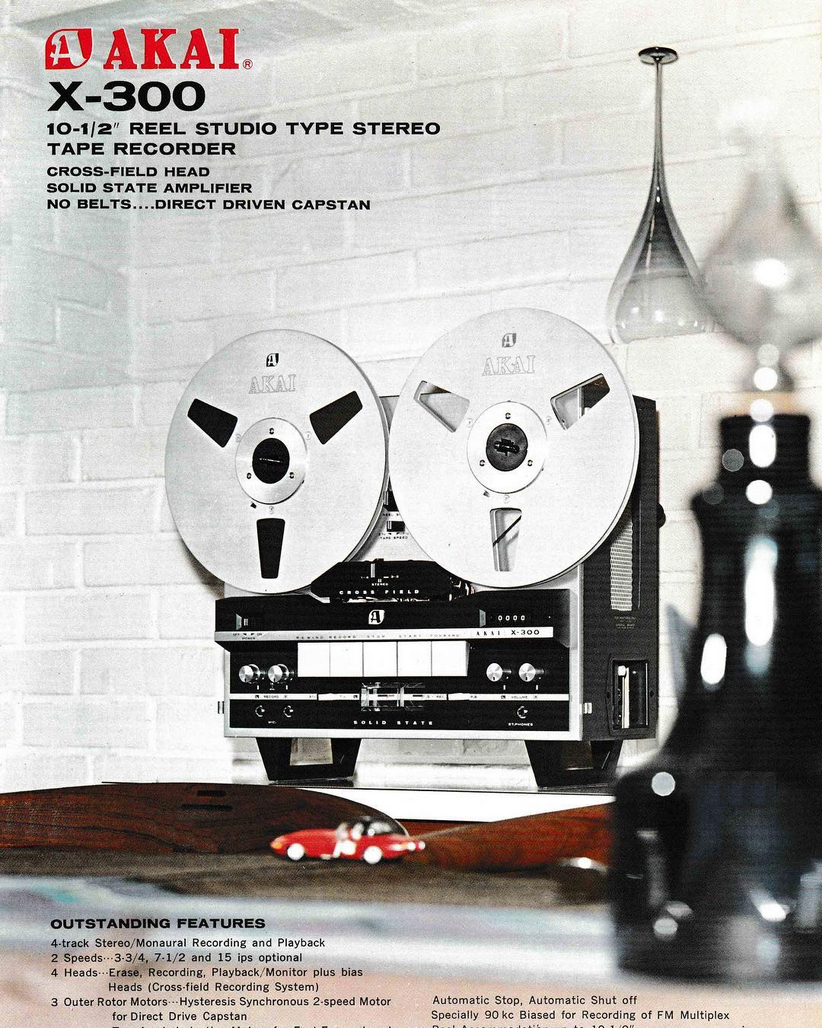Difference between revisions of "Akai X-300"
| (4 intermediate revisions by the same user not shown) | |||
| Line 1: | Line 1: | ||
__NOTOC__ | __NOTOC__ | ||
| − | == | + | == Data == |
| − | {{ | + | {{navigation}} |
| − | ''' | + | '''General''' |
| − | * | + | * Manufacturer: [[Akai]] |
| − | * | + | * Model: X-300 |
| − | * | + | * Type: Reel-to-reel tape with built-in amplifier |
| − | * | + | * Years of manufacture: 1965 - 1968 |
| − | * | + | * Made in: Japan |
| − | * | + | * Color: silver, cabinet wood walnut |
| − | * | + | * Original price approx.: 1'998 DM |
| − | ''' | + | '''Technical data''' |
| − | |||
| − | |||
| − | |||
| − | |||
| − | |||
| − | |||
| − | |||
| − | |||
| + | [[File:Akai X-300-Daten.jpg]] | ||
| − | |||
| − | + | '''Special Features''' | |
| − | + | * Crossfield audio head system: in the Crossfield audio head system, the so-called bias magnetization of the tape is not performed by the recording/playback head, as is generally the case, but by a separate audio head (bias head) located opposite the aforementioned recording/playback head. This audio head arrangement allows signal modulation over the entire audio frequency spectrum without any interference from bias magnetization as is the case with other audio head systems. | |
| − | + | * Automatic band cut-off | |
| − | ''' | + | * Separate high and low frequency controls |
| − | |||
| − | |||
| − | |||
| − | |||
| − | |||
| − | |||
| − | |||
| − | |||
| − | |||
| − | |||
| − | |||
| − | |||
| − | |||
| − | * Crossfield | ||
| − | * | ||
| − | |||
| − | |||
| − | * Separate | ||
* Multiplay | * Multiplay | ||
* Echo | * Echo | ||
| − | * | + | * Vertical and horizontal operation possible |
| − | * | + | * Excerpt from brochure: Akai Crossfield sound head system |
| − | [[ | + | [[File:Akai X-330-Crossfield-1.jpg]] |
| − | == | + | == Comments == |
| − | * | + | * Other models in the same series: |
* [[Akai 1710 L]] | * [[Akai 1710 L]] | ||
* [[Akai 1710 W]] | * [[Akai 1710 W]] | ||
| Line 69: | Line 43: | ||
* [[Akai GX-365]] | * [[Akai GX-365]] | ||
* [[Akai GX-365 D]] | * [[Akai GX-365 D]] | ||
| + | * [[Akai M-8]] | ||
* [[Akai M-10 L/W]] | * [[Akai M-10 L/W]] | ||
| + | * [[Akai X-100 D]] | ||
* [[Akai X-150 D]] | * [[Akai X-150 D]] | ||
* [[Akai X-200 D]] | * [[Akai X-200 D]] | ||
| Line 82: | Line 58: | ||
| − | == | + | == Pictures == |
| − | * | + | * Excerpt from brochure: Akai X-300 |
| − | [[ | + | [[File:Akai X-300-Prospekt-1.jpg]] |
| − | == | + | == Reports == |
| Line 93: | Line 69: | ||
| − | [[ | + | [[Category:Tape machines]] |
Latest revision as of 10:41, 24 August 2019
Data
General
- Manufacturer: Akai
- Model: X-300
- Type: Reel-to-reel tape with built-in amplifier
- Years of manufacture: 1965 - 1968
- Made in: Japan
- Color: silver, cabinet wood walnut
- Original price approx.: 1'998 DM
Technical data
Special Features
- Crossfield audio head system: in the Crossfield audio head system, the so-called bias magnetization of the tape is not performed by the recording/playback head, as is generally the case, but by a separate audio head (bias head) located opposite the aforementioned recording/playback head. This audio head arrangement allows signal modulation over the entire audio frequency spectrum without any interference from bias magnetization as is the case with other audio head systems.
- Automatic band cut-off
- Separate high and low frequency controls
- Multiplay
- Echo
- Vertical and horizontal operation possible
- Excerpt from brochure: Akai Crossfield sound head system
Comments
- Other models in the same series:
- Akai 1710 L
- Akai 1710 W
- Akai 4000
- Akai 4000 D
- Akai 4000 DS
- Akai GX-220
- Akai GX-220 D
- Akai GX-280
- Akai GX-280 D
- Akai GX-365
- Akai GX-365 D
- Akai M-8
- Akai M-10 L/W
- Akai X-100 D
- Akai X-150 D
- Akai X-200 D
- Akai X-300
- Akai X-330
- Akai X-330 D
- Akai X-360
- Akai X-360 D
- Akai X-1800 SD
- Akai X-2000 SD
- Akai X-5000 L/W
Pictures
- Excerpt from brochure: Akai X-300


